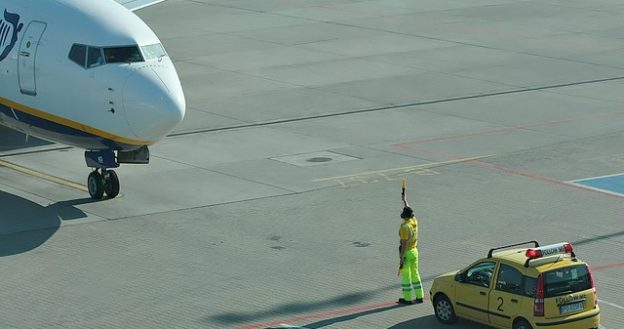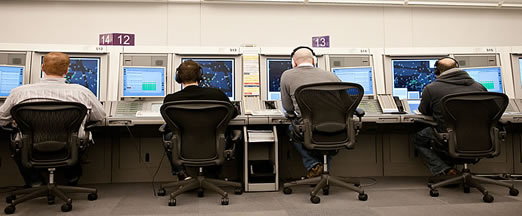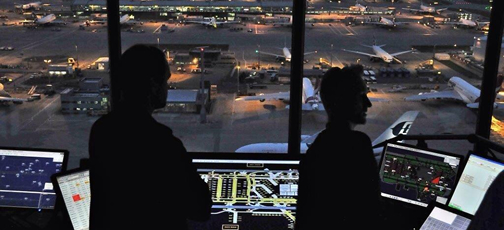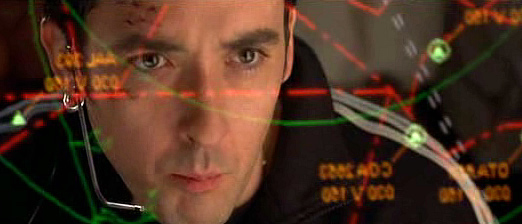Eight air traffic control myths busted
10 April 2015We spend a lot of time talking about what air traffic control (ATC) is and explaining how it works, but what about the many myths that are out there about ATC?
Films such as Pushing Tin do nothing to help separate fact from fiction so we’ve attempted to do just that right here and tackle eight of the most common misconceptions about ATC, airspace and controllers. Let us know if you believed any of these falsities or have any others that aren’t included here.
1. Air traffic controllers are the people with the table tennis bats
Probably the biggest misconception of all is that controllers are the people on the ground at airports, directing planes going to the gate. These are actually Aircraft Marshallers, who are part of the airport’s ground handling team.
2. You need a degree to be an air traffic controller
You don’t need a degree, or any special qualification to be a controller, other than five GCSEs or equivalent at Grade C or above, including English and Maths. Suitability for the job is actually based on people’s aptitude for things like multi-tasking and spatial awareness. The selection process is quite rigorous though and involves a lot of 3D problem-solving scenarios to test analytical skills. There is also a misconception that maths is a staple feature in an air traffic controller’s life, but only light calculations are involved on a day-to-day basis.
3. Air traffic controllers are based at airports
Some controllers are based in air traffic control towers at airports, however, the majority of controllers are based in control centres, often many miles away from airports. They hold responsibility for controlling aircraft once they have departed and also high level ‘en route’ aircraft that may only be flying over the UK and not flying into or out from a British airport at all.
4. Air traffic control centres and towers are like financial trading floors
Contrary to the belief that controllers spend their days screaming and shouting like traders in Wall Street, centres and towers are calm and controllers always keep their cool – especially in emergencies. Air traffic control is not a stressful job thanks to the extensive training and the aptitudes and attitudes of the controllers themselves.

5. All aircraft in UK skies are controlled
Airspace can be either controlled or uncontrolled. Controlled airspace is actively monitored and managed by air traffic controllers and aircraft must gain a clearance from a controller when entering controlled airspace. Uncontrolled airspace is not supervised so clearance is not required to operate there. The large majority of light aircraft and helicopters operate outside or underneath controlled airspace.
6. It’s hard for foreign pilots and controllers to communicate because of language differences
English was mandated as the language of international flying in the years after World War II, as commercial aviation expanded worldwide. The International Civil Aviation Organisation (ICAO) has established English language proficiency requirements for all pilots operating on international routes, and all air traffic controllers who communicate with foreign pilots. These standards require pilots and air traffic controllers to be able to communicate proficiently using both ICAO phraseology and plain English.
7. You can listen to air traffic control radio transmissions
It is illegal under the Wireless Telegraphy Act 1949 2006 to listen to anything other than general reception transmissions unless you are either a licensed user of the frequencies in question or have been specifically authorised to do so by a designated person.
8. Air traffic control closes airspace and runways
NATS does not have the authority to close UK airspace – as a whole or partly. Any closure, that may result from a terror threat for example, can only be authorised by the Government. As with the creation of all temporary restricted airspace (RATs), the DfT would have to publish a Statutory Instrument closing UK airspace; the CAA would then be responsible for enforcing the closure. This is obviously a very rare event – even during the volcanic ash situation in 2010, the UK’s airspace was not actually ‘closed’. Air traffic control is also not responsible for the closure of any runways. Such decisions are up to the individual airport’s operational team, although the closure must be fully ‘NOTAMed’ in advance.
[Header image by Chris via Flickr]
Comments
Please respect our commenting policy and guidelines when posting on this website.






10.04.2015
11:29
Alison Ford
I interested in the research that has gone on to prove that air traffic control is not a stressful job. Can you point me in the direction I can find it?
10.04.2015
13:10
Paul Beauchamp
Senior Communications Manager, Brand PR & Marketing CommunicationsHi Alison, of course everyone is different, but most of the controllers I’ve ever spoken to don’t describe the job as stressful. Pressured at times? Absolutely, but not stressful. For example, here’s an interview Fran Slater from Terminal Control gave to the Telegraph saying as much: http://www.telegraph.co.uk/travel/travelnews/11447024/The-stress-free-world-of-air-traffic-control.html
13:10
Paul Beauchamp
Senior Communications Manager, Brand PR & Marketing Communications10.04.2015
14:46
Adam
The Wireless Telegraphy Act was repealed and replaced with a new act of the same name in 2006!
10.04.2015
15:25
Paul Beauchamp
Senior Communications Manager, Brand PR & Marketing CommunicationsGood spot Adam – duly updated.
15:25
Paul Beauchamp
Senior Communications Manager, Brand PR & Marketing Communications10.04.2015
16:47
Mark
“It is illegal under the Wireless Telegraphy Act 1949 2006 to listen to…” but so many people do on a regular basis. Most aviation enthusiasts use radios and scanners to listen to both civil and military aviation transmissions, and as far as I’m aware, this has never been challenged by any authority.
I hope this situation never changes as listening to ATC transmissions is a useful and often fascinating part of the hobby and love of the world of aviation.
10.04.2015
20:14
Adam
Perhaps some shouldn’t be posting RT recordings on YouTube though. Listening in only is one thing, recording it and posting it online is another!
11.04.2015
09:34
Mike Arnold
Re : Stress in Air Traffic Control. Perhaps the International Labour Organisation article on Stress In ATC http://www.ilo.org/wcmsp5/groups/public/—ed_protect/—protrav/—safework/documents/publication/wcms_118241.pdf gives a more sophisticated perspective on the subject ?
11.04.2015
10:10
Steven Penny
The aviation society Air Britain I believe asked OFCOM whether they would prosecute anybody listening to ATC transmissions some time ago. The answer is they would not as long as the information gained was for private use only.
14.04.2015
22:41
Steve
With my pedant hat on, in point 1, the people you refer to are aircraft MARSHALLERS. Aircraft Marshalls are an entirely different being, and you would mostly find them in the US with a concealed weapon. I’m fairly sure no Air Traffic Controller has ever been mistaken for one of those!
02.03.2018
20:34
Alex
They say its illegal to listen to ATC transmissions yet there has been a live heathrow approach on youtube for nearly a year now yet no-bodys done anything about it. Plus whats the harm in tuning into your local airport frequency? It doesn’t exactly kill anyone does it?
17.11.2019
22:20
Will
It’s funny reading that listening to ATC broadcasts is illegal, i purchased my first Airband radio, specifically made to listen to ATC broadcasts back in the early 1980s & where was this item purchased ? The aviation enthusiasts shop which was inside the cafe area of the obsevation deck at Gatwick.
That observation deck was used a lot by av enthusists back when Gatwick was just two terminals & they all had receivers.
It’s sad that the observation deck was closed, i spend thousands of hours there as a kid.